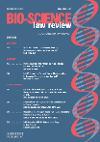Bio-Science Law Review - Volume 17 - Issue 5

EDITORIAL
IS THE UPC DEAD OR IS IT MERELY RESTING? UK GOVERNMENT WITHDRAWS FROM THE UPC
PAUL ENGLAND Taylor Wessing
ARTICLES
PROFITEERING FROM THE PANDEMIC: COUNTERFEITING AND THE COVID-19 CRISIS
MICHAEL BLAKENEY University of Western
This article looks at the commercial opportunities which the COVID-19 crisis has presented to the counterfeiters of medical supplies. It is noted that the counterfeiting of these products is long established, with a number of causes, not the least of which is the definitional confusion, which has hampered regulatory efforts. The article looks at the role of organised crime in medical counterfeiting and international efforts to negotiate a counterfeit medicines treaty.
G 3/19 ‘PEPPER’ – PATENTABILITY OF PLANTS OBTAINED BY BREEDING PROCESSES. IS THIS THE END?
MICHAEL A. KOCK Dr Kock Consulting, Basel, Switzerland
On 14 May 2020, the Enlarged Board of Appel (EBA) in Decision G3/19 ‘Pepper’ at first sight put an end to the debate about the patentability of breeding methods and plants obtained therefrom. In a fundamental change in practice, the EBA abandoned the interpretation of Article 53(b) EPC given in Decision G2/12 and found that the exception for essentially biological processes under Article 53(b) EPC extends to products exclusively obtained by such processes following theprinciple of a ‘dynamic interpretation’ of the law. This article discusses what has been decided, the practical and judicial implications, and the issues left open, and attempts to look into a crystal ball to see what may come next.
CASE COMMENTS
PAY THE FEE OR LOSE YOUR SPC. A LOOK AT THE MASTER DATA CENTER, INC.CASE AND THE IMPORTANCE OF SPCs
INGA PIETSCH AND HUW EVANS Gowling WLG
This case comment looks at the decision in Master Data Center, Inc.and how failure to comply with certain procedural requirements of the SPC regime resulted in the loss of two years of exclusivity of Genentech’s drug ranibizumab (trade name Lucentis). The comment highlights the importance and financial value of SPCs as a way to prolong exclusivity to enable innovator companies to recoup the costs of the years of investment needed to bring a treatment to market.
COMMONWEALTH OF AUSTRALIA DENIED COMPENSATION IN PLAVIX LITIGATION
KIM O’CONNELL AND SARAH-JANE FRYDMAN King & Wood Mallesons
In the first decision of its kind in Australia, the Federal Court has dismissed the Commonwealth’s claim for compensation pursuant to an undertaking as to damages given by Sanofi. Sanofi gave the usual undertaking in exchange for the grant of an injunction restraining Apotex from launching generic clopidogrel (Plavix®) products. Sanofi’s patent was ultimately found to be invalid and the Commonwealth sought damages for its additional expenditure on Plavix®products under the Pharmaceutical Benefits Scheme, which would not have been incurred had the generic products been launched. The decision highlights the significant challenges faced by a non-party in succeeding in such claims and the critical importance of the interlocutory orders.
MOUSETRAP: INSUFFICIENCY TRAPS TWO ‘GROUND BREAKING’ PATENTS IN REGENERON VKYMAB
ANGUS MILNE AND DR BRIAN WHITEHEAD Haseltine Lake Kempner LLP
The Supreme Court’s decision highlights the danger to UK patents of failing to meet strict sufficiency requirements. But decisions made at the patent drafting stage can minimise insufficiency risk (and thereby safeguard investment in R&D).
AIM BIOTECHS: WILL THE FUTURE BE AS ROSY AS THE PRESENT?
SUNJAY MALHOTRA Pinsent Masons LLP, London
As the Covid-19 pandemic continues to spread across the world and the likelihood of a second wave increases, the spotlight has been shining ever more brightly on biotech companies. What has been the impact on their share price, how have AIM-listed biotech companies adapted, and what can we expect going forward?
